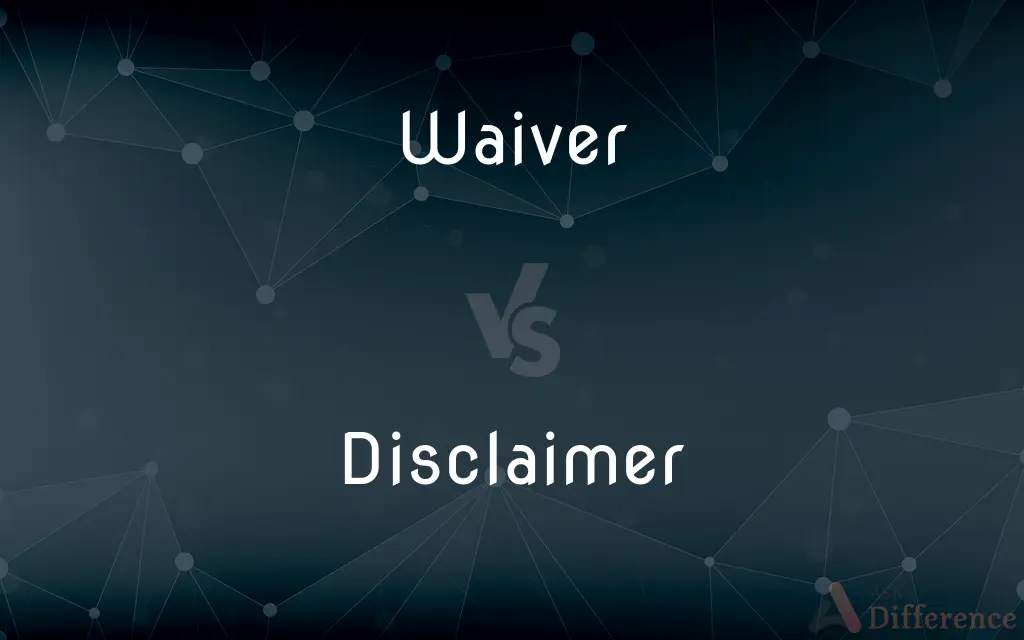Waiver vs. Disclaimer — What's the Difference?
By Tayyaba Rehman — Updated on October 16, 2023
"Waiver" means voluntarily giving up a right; "disclaimer" is denying responsibility.

Difference Between Waiver and Disclaimer
Table of Contents
ADVERTISEMENT
Key Differences
A "waiver" is the voluntary surrender of a known right, claim, or privilege. It can be used in various legal contexts. For example, signing a waiver to not sue a company for potential future injuries. On the other hand, a "disclaimer" is an assertion designed to forestall a legal claim or prevent a misunderstanding. It denies responsibility or connection with potential misconduct or liability. An example would be a sign at a parking garage that disclaims responsibility for damage to cars.
In contractual environments, a "waiver" is often a written document that records a party’s surrender of certain rights. This could be rights to claims, privileges, or even the right to enforce the contract's terms. However, a "disclaimer" is a statement in a contract that limits the rights and obligations of a party. It typically seeks to limit potential liability that may be incurred due to the actions or failures of one of the parties involved.
When considering the legal enforceability, a "waiver" generally requires a party's clear and informed consent, sometimes necessitating a signature. It's an affirmative act that signifies agreement. Conversely, a "disclaimer" might not require direct consent from the party it affects, often appearing as fine print or a standard notice in a document or product package.
"Waivers" are commonly associated with physical activities or events where there is an inherent risk involved, and the organization or individual running the event requires participants to relinquish any claims for liability. "Disclaimers," however, are more often associated with intellectual property or commercial goods and services, where a company declares certain conditions that they will not be responsible for.
Finally, in a more subjective sense, a "waiver" may often feel more like a mutual agreement — something a person actively agrees to. In contrast, a "disclaimer" can often feel more imposed by one party onto others — it's something you're informed of, rather than something you actively agree to.
ADVERTISEMENT
Comparison Chart
Definition
Voluntary surrender of right
Statement denying responsibility
Legal Context
Often requires signature
Often standard, no signature required
Typical Use
Physical activities, events
Goods, services, intellectual property
Effect
Prevents legal claims against waiving party
Limits legal liability for asserting party
Perception
Mutual agreement
Imposed declaration
Compare with Definitions
Waiver
Documented abandonment of a claim.
She signed a waiver abandoning any claims to future revenue.
Disclaimer
Statement to reject responsibility.
The manual had a disclaimer about potential errors.
Waiver
Legal instrument foregoing legal right.
The contract included a waiver of liability for potential damages.
Disclaimer
Denial of endorsement or affiliation.
The article included a disclaimer that views expressed were not the employer’s.
Waiver
Surrender of benefit or advantage.
He provided a waiver of his rights to the invention.
Disclaimer
Notice to limit legal obligations.
The contract contained a disclaimer regarding warranty coverage.
Waiver
Formal statement giving up a privilege.
The document served as a waiver of his claim to the estate.
Disclaimer
Proclamation to delineate boundaries.
The website had a disclaimer about links to third-party sites.
Waiver
A waiver is the voluntary relinquishment or surrender of some known right or privilege. Regulatory agencies of state departments or the federal government may issue waivers to exempt companies from certain regulations.
Disclaimer
Legal assertion to prevent a claim.
The ticket had a disclaimer of liability for personal items.
Waiver
Intentional relinquishment of a right, claim, or privilege.
Disclaimer
A disclaimer is generally any statement intended to specify or delimit the scope of rights and obligations that may be exercised and enforced by parties in a legally recognized relationship. In contrast to other terms for legally operative language, the term disclaimer usually implies situations that involve some level of uncertainty, waiver, or risk.
Waiver
The document that evidences such relinquishment.
Disclaimer
A repudiation or denial of responsibility or connection.
Waiver
A dispensation, as from a rule or penalty.
Disclaimer
(Law) A declining of responsibility or liability for something.
Waiver
Permission for a professional athletic club to assign a player to the minor leagues or release a player from the club, granted only after all other clubs have been given the opportunity to claim the player and have not done so.
Disclaimer
One who disclaims, disowns, or renounces.
Waiver
A deferment.
Disclaimer
A public disavowal, as of responsibility, pretensions, claims, opinions, etc.
Waiver
To provide with a waiver or issue a waiver for.
Disclaimer
(legal) A denial, disavowal, or renunciation, as of a title, claim, interest, estate, or trust; relinquishment or waiver of an interest or estate.
Waiver
The act of waiving, or not insisting on, some right, claim, or privilege.
Disclaimer
(proscribed) A disclosure of an interest, relationship, or the like.
Waiver
(legal) A legal document removing some requirement, such as waiving a right (giving it up) or a waiver of liability (agreeing to hold someone blameless).
I had to sign a waiver when I went skydiving, agreeing not to sue even if something went wrong.
Disclaimer
To disclaim or disavow, as by appending a legal disclaimer.
Waiver
Something that releases a person from a requirement.
I needed a waiver from the department head to take the course because I didn't technically have the prerequisite courses.
I needed a waiver from the zoning board for the house because the lot was so small, but they let me build because it was next to the park.
Disclaimer
One who disclaims, disowns, or renounces.
Waiver
(obsolete) The process of waiving or outlawing a person.
Disclaimer
A denial, disavowal, or renunciation, as of a title, claim, interest, estate, or trust; relinquishment or waiver of an interest or estate.
Waiver
(transitive) To waive (to relinquish, to forego).
Disclaimer
A public disavowal, as of pretensions, claims, opinions, and the like.
Waiver
The act of waiving, or not insisting on, some right, claim, or privilege.
Disclaimer
(law) a voluntary repudiation of a person's legal claim to something
Waiver
A formal written statement of relinquishment
Disclaimer
Denial of any connection with or knowledge of
Waiver
Voluntary relinquishment of a right.
By signing this, you issue a waiver of your right to sue.
Common Curiosities
What is a disclaimer?
A disclaimer is a statement denying responsibility, designed to prevent legal claims or misunderstandings.
Are waivers legally binding?
Yes, waivers can be legally binding if they are well-crafted, clear, and signed voluntarily.
What is a waiver?
A waiver is a voluntary surrender of a known right, claim, or privilege.
Do I sign a waiver or a disclaimer?
You sign a waiver to give up certain legal rights; a disclaimer is typically a written statement you acknowledge.
Do disclaimers protect from all liabilities?
No, disclaimers do not protect from all liabilities, especially if there's negligence or statutory duties involved.
Are waivers and disclaimers permanent?
Generally, the terms within waivers and disclaimers dictate their duration.
What happens if I don’t agree to a waiver?
You may be denied participation in an activity or service if you don’t agree to a waiver.
Can I ignore disclaimers?
Ignoring disclaimers can lead to misunderstandings or legal complications, as you're assumed to be aware of them.
What's the difference in use between waivers and disclaimers?
Waivers are often used for physical activities to relinquish legal claims, while disclaimers are used to deny responsibility in products or services.
Are online waivers and disclaimers valid?
Yes, if they meet legal requirements and the user has a chance to reasonably review and agree to them.
Can I retract a waiver?
Generally, no. A waiver is a binding legal document, though it depends on the specific circumstances and local laws.
Can a disclaimer be oral?
Yes, but oral disclaimers can be harder to enforce than written ones due to lack of evidence.
Can minors sign waivers or disclaimers?
Minors generally can't legally sign waivers or disclaimers; a parent or guardian usually does so on their behalf.
Is a disclaimer effective if I didn’t read it?
Generally, yes. Disclaimers are usually enforceable even if they were not read, as long as they were reasonably presented.
Why are waivers and disclaimers important in business?
They help manage risk, prevent legal disputes, and clarify terms and conditions between parties.
Share Your Discovery

Previous Comparison
Helistop vs. Heliport
Next Comparison
Usherette vs. UsherAuthor Spotlight
Written by
Tayyaba RehmanTayyaba Rehman is a distinguished writer, currently serving as a primary contributor to askdifference.com. As a researcher in semantics and etymology, Tayyaba's passion for the complexity of languages and their distinctions has found a perfect home on the platform. Tayyaba delves into the intricacies of language, distinguishing between commonly confused words and phrases, thereby providing clarity for readers worldwide.
















































